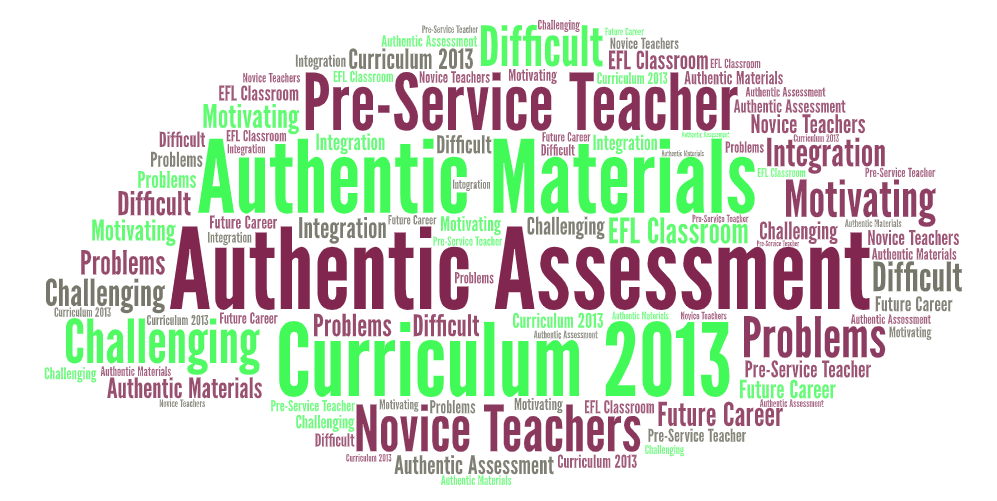Preparing EFL pre-service teachers for curriculum 2013 through authentic materials and assessment integration
DOI:
https://doi.org/10.21070/jees.v6i1.829Keywords:
Pre-service English Teacher; Curriculum 2013; Authentic Assessment; Authentic MaterialsAbstract
Changes in Curriculum lead to changes in teaching and learning processes as well as new ways to demonstrate best practices for increasing students’ achievement. The Curriculum 2013 suggests teachers to use authentic materials and requires them to apply authentic assessments. It is quite challenging for English teachers because this condition creates problems especially for novice teachers. Therefore, they need to have prior knowledge and personal experience related to teaching practice and situation. In this study, authentic materials and authentic assessments were implemented in pre-service-English-teacher classroom at a university in Bogor, specifically in listening class, in order to familiarize them to the kind of materials and assessments. Action research was employed where documentation, observation, questionnaire, and interview were used to collect the data. The result shows that the integration of authentic materials and authentic assessment in EFL classroom helped the students in understanding the nature and the use of authentic materials and authentic assessment for their future needs of profession.
Downloads
References
Aliningsih, F., & Sofwan, A. (2015). English Teachers’ Perceptions and Practices of Authentic Assessment. English Teachers’ Perceptions and Practices of Authentic Assessment. https://doi.org/10.15294/lc.v10i1.4154
Arianie, M. (2017). Authentic Material and Interactive Activities in EFL Classroom. English Franca : Academic Journal of English Language and Education. https://doi.org/10.29240/ef.v1i2.289
Astika, G., & Kurniawan, A. (2020). The challenges of using TED Talks as authentic resources of academic listening for EFL university students. Indonesian Journal of Applied Linguistics. https://doi.org/10.17509/ijal.v9i3.23209
Bacon, S. M., & Finnemann, M. D. (1990). A Study of the Attitudes, Motives, and Strategies of University Foreign Language Students and Their Disposition to Authentic Oral and Written Input. The Modern Language Journal. https://doi.org/10.1111/j.1540-4781.1990.tb05338.x
Citra Dewi, R. (2018). Utilizing Authentic Materials on Students’ Listening Comprehension: Does it have Any Influence? Advances in Language and Literary Studies. https://doi.org/10.7575/aiac.alls.v.9n.1p.70
Murphy, V., Fox, J., Freeman, S., & Hughes, N. (2017). “Keeping it Real”: A review of the benefits, challenges and steps towards implementing authentic assessment. All Ireland Journal of Higher Education, 9(3).
Hart, C., Hammer, S., Collins, P., & Chardon, T. (2011). The Real Deal: Using Authentic Assessment to Promote Student Engagement in the First and Second Years of a Regional Law Program. Legal Education Review.
Kemmis, S., McTaggart, R., Nixon, R., Kemmis, S., McTaggart, R., & Nixon, R. (2014). A New View of Participation: Participation in Public Spheres. In The Action Research Planner. https://doi.org/10.1007/978-981-4560-67-2_2
Kiliçkaya, F. (2004). Authentic Materials and Cultural Content in EFL Classrooms. Online Submission.
Kinay, İ. (2018). Investigation of Prospective Teachers’ Beliefs Towards Authentic Assessment. World Journal of Education. https://doi.org/10.5430/wje.v8n1p75
Lee, W. Y. chun. (1995). Authenticity Revisited: Text Authenticity and Learner Authenticity. ELT Journal. https://doi.org/10.1093/elt/49.4.323
María A, M. H., Junior A, V. C., & Astrid, R. V. (2018). TED Talks as an ICT Tool to Promote Communicative Skills in EFL Students. English Language Teaching. https://doi.org/10.5539/elt.v11n12p106
Montgomery, K. (2002). Authentic Tasks and Rubrics: Going Beyond Traditional Assessments in College Teaching. College Teaching. https://doi.org/10.1080/87567550209595870
Mueller, J. (2017). Authentic Assessment Toolbox. 2017.
Nurkamto, J. (2016). Teachers’ Creativity in Transforming the Mandated Curriculum into a Linguistically and Culturally. Proceedings of the Fourth International Seminar OnEnglish Language and Teaching (ISELT-4), May, 11–12.
Oguz, A., & Bahar, H. O. (2008). The Importance of Using Authentic Materials in Prospective Foreign Language Teacher Training. Pakistan Journal of Social Sciences.
Olfos, R., & Zulantay, H. (2007). Reliability and validity of authentic assessment in a web based course. Educational Technology and Society.
Peacock, M. (1997). The effect of authentic materials on the motivation of EFL learners. ELT Journal. https://doi.org/10.1093/elt/51.2.144
Permendikbud No. 104 year 2014. (2014). Nomor 104 Tahun 2014 Tentang Penilaian hasil Belajar Oleh Pendidik Pada Pendidikan Dasar dan Pendidikan Menengah. Pedoman Evaluasi Kurikulum.
Permendikbud No. 81A. (2013). Permendikbud Nomor 81A Tahun 2013 Tentang Implementasi Kurikulum. Permendikbud.
Richards, J. C. (2001). Curriculum Development in Language Teaching. In Curriculum Development in Language Teaching. https://doi.org/10.1017/cbo9780511667220
Riyani, T. S. and C. (2019). Authentic Assessment in Elt: Hopes, Challenges, and Practices. Jurnal Ilmiah Kependidikan.
Rukmini, D., & Saputri, L. A. D. E. (2017). The authentic assessment to measure students’ English productive skills based on 2013 Curriculum. Indonesian Journal of Applied Linguistics. https://doi.org/10.17509/ijal.v7i2.8128
Rusmawaty, D., Atmowardoyo, H., Hamra, A., & Noni, N. (2018). Teachers’ Beliefs of Authentic Materials for Teaching Reading in Indonesian EFL Classrooms. Journal of Language Teaching and Research. https://doi.org/10.17507/jltr.0903.21
Sari, D. F. (2016). Authentic Materials for Learning English: A Study on EFL Students in Aceh. Studies in English Language and Education. https://doi.org/10.24815/siele.v3i2.4962
Swaffield, S. (2011). Getting to the heart of authentic Assessment for Learning. Assessment in Education: Principles, Policy and Practice. https://doi.org/10.1080/0969594X.2011.582838
Trisanti, N. (2014). English teacher’s perspective on authentic assessment implementation of curriculum 2013. The 61st TEFLIN Intenational Conference, 1173–1175.
Umam, A., & Indah, Y. A. (2020). Exploring In-Service TEYL Teachers’ Assessment Literacy: Implication For Continuing Professional Development. JEES (Journal of English Educators Society). https://doi.org/10.21070/jees.v5i1.364
Varela, E., O’Malley, J. M., & Pierce, L. V. (1997). Authentic Assessment for English Language Learners: Practical Approaches for Teachers. TESOL Quarterly. https://doi.org/10.2307/3587987

Published
How to Cite
Issue
Section
License
Copyright (c) 2021 Alan Jaelani, Amalul Umam

This work is licensed under a Creative Commons Attribution 4.0 International License.







